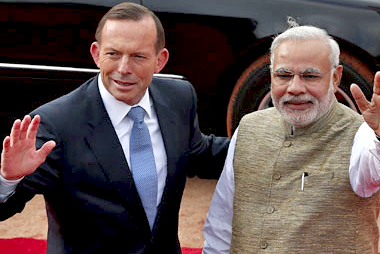New Delhi, Sept 5: Prime Minister Tony Abbott today said he will sign an agreement with India to sell uranium for non-weapon use.
 "Prime Minister Modi and I will today sign a nuclear cooperation agreement that will finally allow Australian uranium to India," he said while addressing a meeting here, organised by industry chambers including CII and Ficci.
"Prime Minister Modi and I will today sign a nuclear cooperation agreement that will finally allow Australian uranium to India," he said while addressing a meeting here, organised by industry chambers including CII and Ficci.
Abbott, who arrived here this morning, was given a ceremonial reception in the forecourt of Rashtrapati Bhavan.
Besides meeting Modi, Abbott is scheduled to call on President Pranab Mukherjee and Vice President Hamid Ansari.
He arrived in Mumbai yesterday amid expectations that the two countries will ink the nuclear deal and initiate steps to deepen strategic ties and strengthen two-way trade and commerce.
The efforts to sign civil nuclear deal have been underway since 2012 after Labour party in Australia reversed its decision to ban the sale of uranium to India because of New Delhi not being a signatory to the Nuclear Non-Proliferation Treaty.
"I am hoping to sign a nuclear co-operation agreement that will enable uranium sales by Australia to India," Abbott had told his Parliament on the eve of his visit to India.
He had said that if Australia was prepared to sell uranium to Russia then "surely we ought to be prepared to provide uranium to India under suitable safeguards", noting it was a "fully functioning democracy with the rule of law".
India is not a signatory to the NPT, but Abbott has stressed that Australia would ensure adequate bilateral safeguards before any deal was signed.
After the failure to conclude a civil nuclear deal with Japan during Modi's visit to that country, the pact with Australia - which has about a third of the world's recoverable uranium resources and exports nearly 7,000 tonnes of it a year - would boost India's energy sector.





Comments
Add new comment